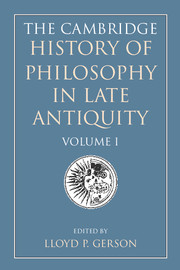Book contents
- Frontmatter
- General introduction
- I Philosophy in the later Roman Empire
- II The first encounter of Judaism and Christianity with ancient Greek philosophy
- III Plotinus and the new Platonism
- IV Philosophy in the age of Constantine
- V The second encounter of Christianity with ancient Greek philosophy
- Introduction to Part V
- 24 Basil of Caesarea
- 25 Gregory of Nyssa
- 26 Gregory of Nazianzus
- 27 Calcidius
- 28 Nemesius of Emesa
- 29 Synesius of Cyrene
- 30 Marius Victorinus
- 31 Augustine
- Map 1 The Byzantine Empire, c. 500
24 - Basil of Caesarea
from V - The second encounter of Christianity with ancient Greek philosophy
Published online by Cambridge University Press: 28 May 2011
- Frontmatter
- General introduction
- I Philosophy in the later Roman Empire
- II The first encounter of Judaism and Christianity with ancient Greek philosophy
- III Plotinus and the new Platonism
- IV Philosophy in the age of Constantine
- V The second encounter of Christianity with ancient Greek philosophy
- Introduction to Part V
- 24 Basil of Caesarea
- 25 Gregory of Nyssa
- 26 Gregory of Nazianzus
- 27 Calcidius
- 28 Nemesius of Emesa
- 29 Synesius of Cyrene
- 30 Marius Victorinus
- 31 Augustine
- Map 1 The Byzantine Empire, c. 500
Summary
INTRODUCTION
Basil was born c. 330 into a rich Cappadocian family. The family of his mother Emmelia appears to have been Christian for some generations. Basil was schooled first by his father, and then in Caesarea. He studied under Libanius in Constantinople for a year in 348/9 and was then in Athens from 349/50. Here he heard, and perhaps studied with, the Christian rhetor Prohaeresius and the non-Christian Himerius. Unfortunately, we know little about the character of the philosophy he also studied. We may surmise that during the 350s Iamblichean Platonism was increasing in importance in Athens, and perhaps Priscus, the intellectual grandchild of Iamblichus and associate of the Emperor Julian, arrived in Athens during Basil’s time there. During the 360s and 370s Basil appears to know some Porphyry, some arguments from the Aristotelian commentary tradition and possibly some Plotinus, but we do not know if he encountered this material in Athens.
In 355–6 he was back in Caesarea as a teacher of rhetoric. At the end of this year Basil toured monasteries in Syria, Palestine and Egypt. This tour seems to have effected or reflected a growing commitment to an overtly Christian life, and in 357 he associated himself with a small ascetic community established in 352 by his elder sister Macrina and their mother, Macrina the elder in Annesi. He was also joined in this enterprise by Gregory Nazianzen, whom he had probably known as a teenager and certainly had been a student with in Athens.
Keywords
- Type
- Chapter
- Information
- The Cambridge History of Philosophy in Late Antiquity , pp. 459 - 470Publisher: Cambridge University PressPrint publication year: 2000

